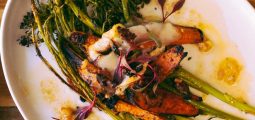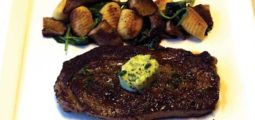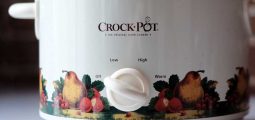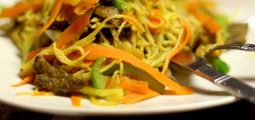The Logos of Cooking
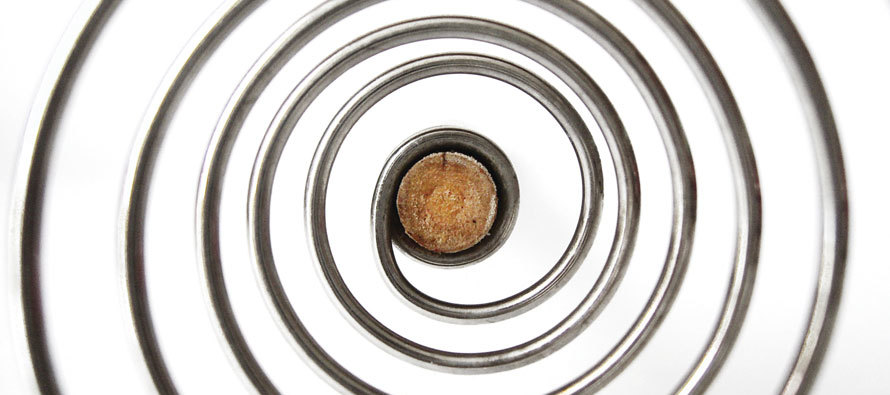
If there is an ethos in cooking, we project it through our own creativity, passion and respect for what we make. Most home cooks would probably just as soon leave it at that. But to really cook, as the immortal Elizabeth David said, does not mean, “skimping the work or the basic ingredients, throwing together a dish anyhow and hoping for the best.” [1] The logo of cooking, then, is simple but never crude.
Culinary skill is about the science of proportion in this very human Liberal Art. It is gastronomic chemistry, and chemistry is all about the numbers. H2O + NaHCO3= leavening, for example, or Vermouth1 + Gin3 + Olive2= a respectable martini. And when you know a little chemistry, the rising of dough and batter, and the mixology of flavors becomes more predictable. To get the proportions wrong, however, can result in anything from bombed biscuits to musty martinis to gloppy greasy gravy. When you have mastered the basic classic proportions of recipes, you can add, embellish, and improve to your own taste. When you have educated and coaxed your palette through many firings of baked goods, stir fries, sautés and grills, you can approach any dish from any country on any level of complexity with confidence. In other words, knowledge, practice, evaluation and feedback are how we learn to taste and to cook, and are essential to anyone preparing food.
Never underestimate science’s ability to produce thing that are 1) measurable, 2) predictable, and 3) reproducible. These three terms define science, and they are relevant for omelettes and cupcakes alike. Don’t be daft like those people on reality shows who say things like, “I’m not here to make friends, I’m here to create,” or “I just like to do things my own way,” all the while imagining that they are much cleverer than they are, and that rules are for suckers. Whether you are building an earthquake-proof sky-scraper, or a tailored jacket or a perfectly smooth zabaglione (an Italian egg custard with sparkling wine), the same thing applies: you must understand the basic scientific principles behind the thing. How does egg thicken liquid? What are the properties of casein and lemon juice and how do they affect milk? What are the basics of fermentation? What is a Maillard reaction? How do different proteins behave in different types of heat? Why does asparagus go with nothing else except more asparagus?
Remain ignorant to basic science at your peril in the kitchen. For me the best way to learn cooking is to watch good cooks, and listen to their “asides,” or comments about how you mustn’t get the pan too hot or you will get scrambled egg instead of zabaglione, or how you can’t add flour to boiling liquid unless it’s in a paste of fat or butter, and how to knead pasta dough until it feel silky. I have stood next to grandmothers and other good cooks, but I have also watched uncounted hours of cooking shows. You remember cooking shows, don’t you? When people used to cook food and show how to do it? And instead of talking about all their famous friends they were going to feed, they talked about the food. You can still get good cooking shows on DVD from stores and libraries. Look for The French Chef with Julia Child for starters. PBS also occasionally broadcasts shows where chefs cook, but beware those chefs who are suffering from cooking fifteen things in separate tiny pots. You don’t have fifteen tiny pots, or time to clean them. You have a life. Even Jacques Pepin, who came up through the obsessive-compulsive world of classical French chefdom, melts chocolate in the microwave now, and happily proclaims, “My wife taught me how to do it and it doesn’t mess up the kitchen!” Bravo Mme Pepin.
Understand your history. Did Marco Polo invent the noodle? Did the Chinese wage war with the first meatball-launching siege weapons? Is Martha Stewart a hack star or is she in fact, a classic chef and possibly the smartest person to ever live besides Einstein and Dick Feynman? Who were all those old dead French guys anyway and why do I care?
Before you judge this recipe or that, or who can cook, or what is truly gourmet or exciting and what is pretentious crap, you had better know your history. Perhaps it was Brillat Savarin or one of his many avatars that said there are no new recipes, and that everything we have ever made is only a copy of something much older. Regardless, before you put your hand to a cookbook or food blog or steamer of dumplings, you had better know what came before you. The Flying Karamozov Brothers used to say during juggling shows, “There’s more to the theater than repetition,” and then repeat it to great comic effect.
Unless you are aiming for comedy, you would be wise to know your history lest you end up repeating something hideous. Observe and learn. You can do in a few months of watching classic cooking videos what it took most apprentice chefs a lifetime to see. Otherwise, find blogs on different cuisines, it may include a delicious recipe that you might want to try on your own. Also, you can read – good for you! Go to the library and start reading. Forget shiny cooking magazines until you know the basic terms on the cover. Read cookbooks, food journals, ethnologies, food history, and gastronomical diaries. Read and read and read until it starts to make sense and you can put a voulette with its spinach, Swiss cheese and nutmeg, into perspective.
Understand the makeup of a dish and why it tastes good. Sometimes sweet, salty and sour go together impeccably like a Thai curry soup, sometimes they are disgusting like savory duck breast laced with cinnamon, ver-jus (a vinegar-like product of wine-making) and enough fresh fig compote to drown a horse. Personal taste aside, you can know what is good and what is not. Barbeque for instance, has more factions than militant third-world political machine, but it does have basic rules that are knowable. Pit-smoking, for example, is really a no-brainer. What you do after that is subject to heritage. And there are unforgivable mistakes. Like insipidly sweet mega-national-franchise barbeque with no slaw. No slaw! Oh … the horror…. So what makes a decent pork roast? Or chili? Or pasta dish?
If you don’t know you cannot judge a good recipe from a bad one, and if you smoke (not pork in a pit, but cigs in a designated smoking area), or do other things to deaden your palette, like drink too much, eat too much salt, fat, and preservatives, so that you can no longer taste simple, plain flavors, then you might as well wipe down the kitchen, go to the drive-through and refrain from judgmental comments on food altogether. Go forth and eat. Experiment, and watch others experiment. Try and fail, and understand and accept that failure. Taste everything, and know what it is. Eat, drink, and be wary.
Work on the logical aspects of cooking, and see why French food took over the world before and Asian flavors are taking it over now, and why a soufflé rises or doesn’t, and how different rices cook differently just as different types of meat do. And as you do that, remember:
- Start with the basics. Look for recipes with fewer, not more ingredients.
- Cook a basic recipe the first time as it is given, and after you master it, you can change it.
- If you change a recipe, note or remember what you changed.
- Don’t be afraid of new food, but admit when you are over your head.
- Explore new worlds of food and ingredients together, gradually, as you learn. Don’t just go putting sugar-cured smoke-dried squid nuggets into everything.
- Ask people who can cook to show you their favorite simple recipe. Why do the work someone else has already done?
- Don’t be picky, but care about what goes into your body. It’s the only one you’ve got, and you’re probably not getting a new one.
I ask you to focus, to work, to make messes. It’s how good science and good food happens, and really, if you think about it, everything else that’s fun, rewarding and worth bragging about.

Ann Summers
Ann Summers is not a 40-umpthing-year old rock climber who got shut down in Boulder Canyon and drowned her failure in a microbrewery. She is neither a mother of two, a fan of Latin plant names nor a lover of fine Italian Grappa. You’ll not catch her shooting guns for fun or hollering like a redneck. She hates Shakespeare, and doesn’t call a certain fast food chain “The Scottish Restaurant.” She turns her nose up at organic yellow beets, eschews fresh oysters, and loathes chubby guinea pigs with Violent Femmes hairdos. She is also a dreadful liar
No comments
Write a commentOnly registered users can comment.
